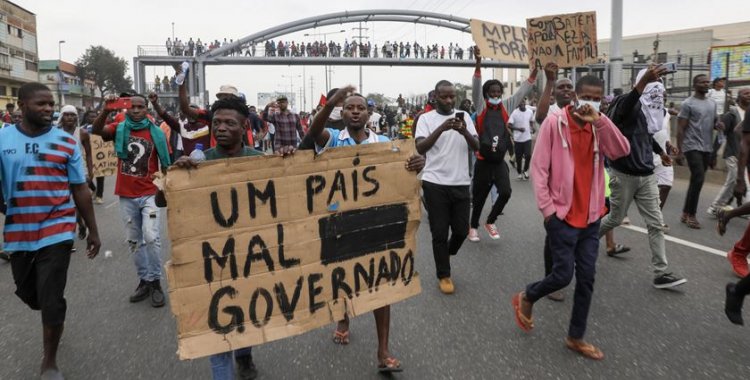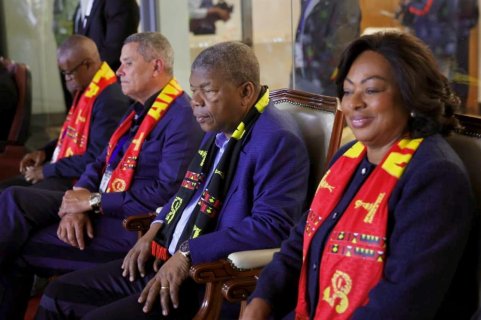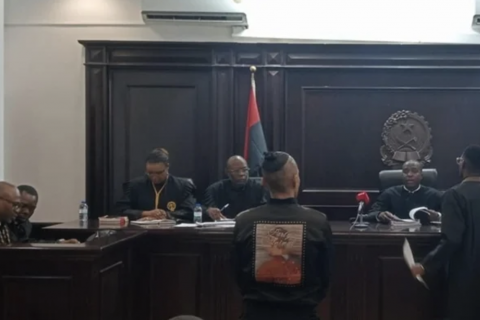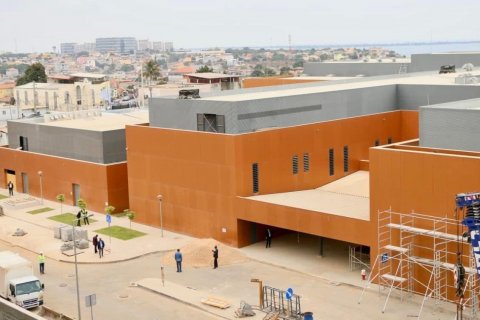The police charge took place shortly after the march began its journey towards Mutamba, about 500 meters from the place of concentration, next to the cemetery of Santana.
The march, convened by activists and members of Angolan civil society, began in a fragmented way at Largo do Cemitério da Santa Ana, with the demonstrators making their way to Avenida Deolinda Rodrigues, shortly after 12:30 pm, half an hour before the scheduled time.
The movement of hundreds of protesters, including activists, members of civil society, motorcycle taxi drivers and even "zungueiras" (street vendors) surprised the police staff on the spot, a fact that caused a rapid deployment after being "swallowed" by the crowd.
In view of the speed of the demonstrators, who were marching in both lanes of the avenue, the intervention of the Rapid Intervention Police (PIR) was requested, having set up a barrier right on top of the Operative Unit viaduct.
The barrier set up by the PIR enraged the demonstrators who intended to cross the viaduct, shouting "the police belong to the people and do not belong to the MPLA (the ruling party)", while another wing of the march circulated in one of the lanes under the viaduct without hindrance.
Protesters "unable" to march over the viaduct insisted on the route and, in response, the police resorted to tear gas grenades, which caused panic and, consequently, the dispersion of the march.
For almost half an hour, the police launched tear gas against the demonstrators who insisted on circulating along the viaduct, but also against those who took refuge in the surrounding areas of the Popular neighbourhood, Rangel district and Congolenses market.
Panic took over that area, with people fainting, while others sought places of refuge and the police reinforced their numbers with vehicles and dogs. Vehicle traffic was cut off, with reports of detainees and injuries.
In the areas adjacent to Largo 1.º de Maio, the police also set up a strong police apparatus and tear gas grenades were also audible to disperse the demonstrators who marched under the viaduct.
The float, where some of the organizers were, who, with slogans, guided the demonstrators, also did not cross the police cordon that was on that viaduct.
"Down with misery", "We don't want to survive, we want to live", "The price of gasoline has gone up, rice has gone up, the cost of living has gone up, only wages have not gone up" were some of the phrases on the placards of the demonstrators, who joined the protest, considered "peaceful" by the organization.
Motorcycle taxi drivers, who say they are being penalized by the rise in fuel prices, also joined the demonstration, complaining of difficulties in exercising their activity and supporting their families.
"We came to protest against the price of gasoline, which is very expensive, many of us are unable to fill up our motorcycles, we have been facing bad days", said José Manda, to Lusa.
António Manuel Tomás, also a motorcycle taxi driver, joined the march to protest against the rise in the price of fuel and basic food products.
"I came here because what we are currently seeing is terrible, life is not favourable, things in the warehouses are going up, we can't work to support the family", he lamented.
Regrets also emerged in the words of "zungueira" Teresa Araújo, who complained of difficulties due to the end of street sales in the capital and the current prices of basic goods.
"I came here because our country is in a bad state, the stores are closed, we are single women, we pay for school, food, a bag of rice rose to 14,000 kwanzas and, therefore, it is very bad", she shot, before applause from the other colleagues.
Before the start of the protest march, more than two hundred people gathered around 10:00 am at the Santana cemetery, in Luanda, where the protest march against the increase in fuel prices and the end of street sales began.
Under the watchful eye of a huge police cordon, activists, mostly young people, shouted, asking for the "promised jobs" and the "end of the repression of street vending", promising to march peacefully to Largo da Mutamba.
Holding signs with slogans such as "gasoline prices rose, rice rose, only wages did not rise", "we want decent wages" and "demonstration is not a crime", they also shouted slogans such as "João Lourenço out", as they the human frame was thickening with the arrival of more demonstrators.
Some motorcycle taxi drivers, the professional class that has been at the center of the protests against the increase in the price of gasoline, were also present at the site awaiting the start of the march, scheduled for 1 pm to Largo da Mutamba, in the heart of Luanda.
"Mamãs zungueiras", the traditional street vendors, also joined the protest, some dancing and singing, others trying to sell some of their wares.
Also present were some opposition deputies, without their party symbols, as UNITA chose to show solidarity with the cause, without officially participating in the demonstration, leaving its militants the possibility of doing so individually.
Some members of non-governmental organizations and civic movements such as Mudei, Lauleno and Sociedade Civil Contestataria also flocked to the concentration area, where a large number of journalists were also present.
The demonstration also took place in other provinces.







